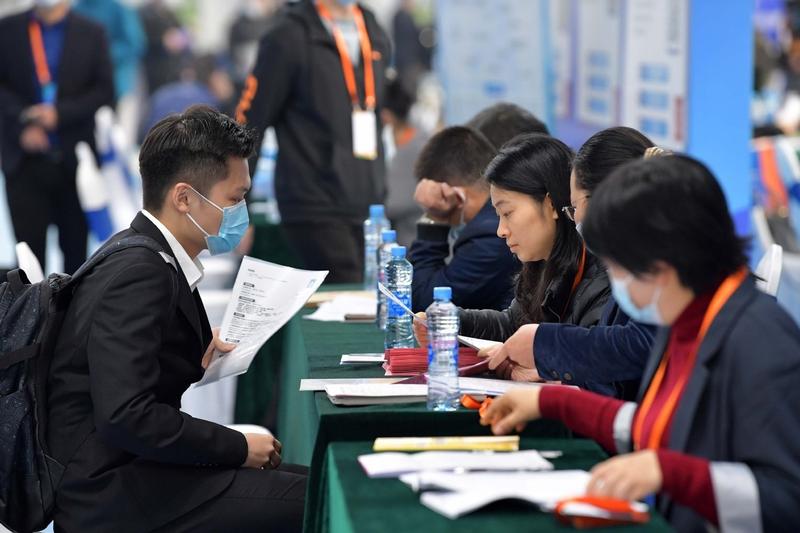
Chinese Premier Li Keqiang attends the Special Virtual Dialogue with Global Business Leaders hosted by the World Economic Forum, delivers remarks and holds dialogue and exchanges with participating global business leaders at the Great Hall of the People in Beijing, capital of China, July 19, 2022. /Xinhua
Chinese Premier Li Keqiang attends the Special Virtual Dialogue with Global Business Leaders hosted by the World Economic Forum, delivers remarks and holds dialogue and exchanges with participating global business leaders at the Great Hall of the People in Beijing, capital of China, July 19, 2022. /Xinhua
Editor's note: Hannan Hussain is a foreign affairs commentator and author. He is a Fulbright recipient at the University of Maryland and a former assistant researcher at the Islamabad Policy Research Institute. The article reflects the author's opinions and not necessarily the views of CGTN.
"China's market is also the world's market. China will continue to pursue all-round opening to both developed and developing countries... and promote free trade and fair trade."
That was the message from Chinese Premier Li Keqiang to the Special Virtual Dialogue with Global Business Leaders, hosted by the World Economic Forum (WEF) this week. Li underlined the merits of China's employment-focused growth approach, and the need to advance targeted macro policies, rather than excessive stimulus.
Li's focus on flexible growth rates is important because this creates suitable conditions to drive employment and price stability forward. After all, a hard-set growth target will identify as a single metric to measure stability, where as stable employment levels, household income growth, and prices have a far stronger role in shaping favorable market conditions. It sends a powerful message about China's near-term economic planning, given that all three of these indicators were part of Li's address to the foreign business community.
By ruling out a super large stimulus or excessive money supply, the Chinese premier also helps evolve our understanding of what a flexible growth target should mean for the country. That includes targeted macro policies that have catered to "the needs of market entities" in the recent past.
Greater stability in market entities' operations has successfully contributed to stability in employment and household income in recent times, strengthening the case for continuity at present. "We will take a realistic approach and do the best within our means to strive for fairly good results in economic development for the whole year," reassured Li.
There is another reason for the global business community to remain very optimistic about China's economic recovery approach. Beijing will not tether the foundations of its economic recovery to "supersize stimulus measures." Instead, once a series of support measures –announced in May – take further effect, China can end up strengthening its defenses against major inflationary pressures.
In fact, the desired effect of China's 2020 stimulus was exactly that: providing the Chinese economy with a compelling foundation to rein in inflationary risks. As a result, it is correct to signal stimulus caution going forward, and insist that the major drivers of economic performance in China should be employment, price stability and household income.

A career fair at Nanchang University in Nanchang, Jiangxi Province, October 23, 2021. /Xinhua
A career fair at Nanchang University in Nanchang, Jiangxi Province, October 23, 2021. /Xinhua
From a measurement viewpoint, a reasonably stable employment situation can provide credible evidence that the market is resilient in the face of economic pressures. The same cannot be said if China was to emphasize an unrealistically high growth pace, and support its attainment at the cost of the country's own future interests.
A nation committed to swift action against economic pressures is the right message to the business community going forward. Consider how Li's speech offered a transparent reading of impacts felt in the second quarter this year, whether from COVID-19 flare-ups to a turn in "major indicators." But China's success in elevating growth stability up its agenda, front-loading its set policies, and denying space to any massive stimulus make it certain: that China is prepared to respond to future uncertainties with pace and precision.
Finally, China's policy of opening-up stands to further benefit the interests of foreign businesses, including through wider market access. For instance, Li indicated China's decision to advance outbound commerce and trade activities going forward. Such measures underscore China's broader commitment to effectively coordinating its "COVID-19 response and economic and social development," to bring out "the initiative of all sides."
Thus understood, Li's dialogue with the foreign business community puts a premium on China's commitment to opening up, and facilitating stability for all. Beijing's emphasis on reasonable growth enables it to steer clear of any stimulus overkill, letting employment stability, business-friendly policies, and price support drive its market dynamism forward.
(If you want to contribute and have specific expertise, please contact us at opinions@cgtn.com. Follow @thouse_opinions on Twitter to discover the latest commentaries on CGTN Opinion Section.)

